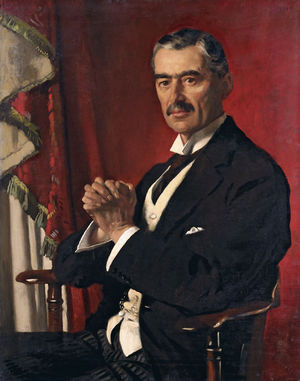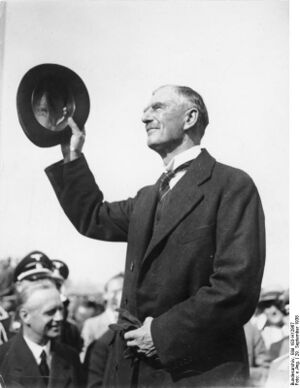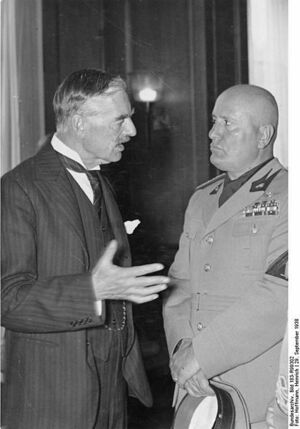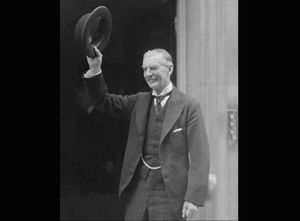UnBooks:The Diary of Neville Chamberlain
The following extracts are taken from the full diaries which the British Prime Minister Neville Chamberlain kept whilst at Number 10 (that's Downing Street) from 1937 to 1940. The extract(s) chosen pertain to the fateful years leading up to an event in history which played itself out from 1939 to 1945; some historians even think this period is reasonably important. Nevertheless, Mr. Chamberlain, as well shall see, had other concerns in the lead-up to to "that war".
March 20, 1938
I spoke with my diplomat Sir Nevile Henderson today. I call him "Hendie" as we are good-old chums, and since we have very similar first-names and I'm the Prime Minister, I shouldn't be the one with the slightly girly nickname.
Anyway, I was trying to make the point that we ought to let Germany sort the Austrian mess out, because I was convinced that most of the trouble was coming from within Austria itself, and nothing to do with what somebody called "Propaganda" emanating from the Nazi Party machine. "Now look here," I said, pointing at myself because Hendie does have a habit of staring into space. "What's this propaganda talk? Hmm? Are you meaning to tell me that that decent Austrian fellow tells the newspapers what to write so he can justify his aggression towards Europe?" I said this whilst gesticulating at poor Hendie with my index finger in the manner of a schoolmaster. It was a gesture I had perfected in my time as a shopkeeper, where I would forever catch young boys nicking handfuls of sweets and chocolate bars, particularly the expensive European ones. Mind you I would let them keep their spoils, but not after giving them a damned good talking-to! Still, I didn't point too firmly at my chargé, as he is a contemporary, you know. I continued: "That might be what we do here in the United Kingdom, but in Germ ..." and here Hendie interrupted me to say that we didn't do propaganda in the United Kingdom at all. It might be something to think about one day. It's what we call "advertising" in business!
I then reflected on how right Napoleon was to call us a "nation of shopkeepers". We are the nation of shopkeepers, par excellence, now that I'm Prime Minister! And it's a good thing on the international stage, because I'm always ready to strike a sterling deal!
March 20, 1938
Just a small addendum to the above entry: nothing major, only I was informed a few hours later that Hitler has "made friends" with Austria! Jolly dee! It's nice to see our Germanic friends uniting and shaking hands, or Anschluss as they like to call it. I sent off a cordial telegram to the German embassy.
April 24, 1938
The news from Europe is not so good. I suppose you cannot expect Europeans to behave decently or with manners, when they haven't had the brilliant upbringing we have in England. Nevertheless, whatever is happening there will not stop me from acquitting myself in the impeccable way in which I am accustomed to. (And please do look at my affixed portrait if should you doubt my comportment.) I still felt my finger-pointing at Hendie a month or so ago was somewhat rash. But at least in Parliament I am urbane. I cannot say that of (and it pains me to curse any man) the oaf himself, Winston Churchill. I often wonder if he is not British himself. He certainly wants me to become more involved in Europe and stop letting things happen as they will. But I don't - and it's not good manners to interfere. And I base this on the soundest logic: We are nation of shopkeepers, not warmongers.
So, it appears that I may have to send poor Hendie to see Adolf to iron out some small problems in Czechoslovakia. And if worse does come to worse, we can say that we have tried (not that Churchill will ever take that as a reason for quietude) and hope that our French friends will show their typical insouciance through military action. It's damned sure that I'm not dirtying the uniforms of our officer class when I've got a shop, er, country, to run. Actually, we don't have an officer class at the minute. Better see to that.
May 30, 1938
Golly, a man just can't write a diary without there being some problems. I received word today from another one of my diplomats, Lord Halifax, stating that he has intercepted crucial intelligence (and yes, the Germans are a clever lot!) from Hitler's military operation. I have some difficulty divining its meaning, despite the fact that it is in English (mostly). It reads:
- "Est is mein unalterable decision to smash Czechoslovakia very strongly in der future."
What an enigma! I suppose I could have sent it to the crypto-boys at Bletchley Park but I really do not think they would stand a chance decoding it. What could it mean?
Later on that day I read out this information in parliament, and as expected there was a general hush of confusion and puzzlement. Except from one voice. And strike me down, it's the paunchy rebel himself, Churchill, howling in a manner akin to apoplexy. He said the secret message meant that Germany were going to invade Czechoslovakia.
At this point, much merriment broke out across the house. We laughed ourselves silly at Churchill's remark. My Chancellor's monocle fell out and broke in the guffawing, an opposition MP ruptured his spleen and had to be taken to the nearest hospital, and what the Paymaster-General did or "performed" in front of or at Winston, is now protected by State Secrecy laws.
Now I do not think it was all that moral to react in the way that we did to poor, deluded Winston. He does like a good rant every now and then and it's this trait that will stop him from becoming a great leader one day. But you do have the consider the damage Winston causes when he makes such remarks - a broken monocle and ruptured spleen are expensive to mend! As a businessman who owned a shop, I made sure expenditure never exceeded income.
September 1938
September 2
Good heavens! I am to fly to go and see the great Adolf himself! And I've never flown before. Two firsts in one mighty go! Reminds me of the time when the wholesalers arrived with the stock and I was the only one serving in the shop! You can't make it up, can you?
Adolf tells me that his Czech neighbours are causing a stink. Now this puts me in a tricky situation because I and my French friends promised the Czechs that I would help them out should they face problems (like invasion, for instance). But, if they're the ones who are up to no good, then I can't very well help them out can I?
In any case, I really look forward to meeting Adolf. It will be just me and him, from what I gather. His letters to me always begin affectionately and wittily: "Dear Zstupid und Gullible Englischman". I see already from his letters that Hitler is well-versed in the thing we British excel at (and this time it's not just shopkeeping!) and that's Irony!
September 22
I discuss things over with Adolf. He is well-meaning but I have to tell him to quieten down a little, as he insists on shouting at full volume even when I am only about a metre away from him. Perhaps he thinks because I am 67 I am beginning to lose my hearing. I assure him that I am not, even if I am a bit older than him. Adolf responded with some obscure remark about my age and then said because of my age that made me some sort of Gunther-Menschen – my German's not great, but that was the gist of Hitler's remark; I must say if I were German I would like the name Gunther very much – and that in his country I wouldn't be "Zer Mighty Reichskanzler" like him but in some "Gott-forzaken Camp of Conzentration!" I responded: "Ha! Well, believe you and me Adolf, I've had to develop my powers of concentration and patience in the Houses of Parliament, especially when you-know-who starts blithering on about some nonsense that you want to invade Czechoslovakia." Adolf laughed a little nervously at this joke. Still, a laugh nonetheless. I return home with Hitler's guarantee that he won't do anything "nasty".
But not everyone thinks as I do. By ceding to my friend Adolf in the name of just wanting to keep the peace, I was booed by a few MPs when I return to England. And just guess who was leading the booing?
September 29
Well, at last we have some sort of solution. This time, the French, Italians and even the Czechoslovakians insisted on coming along as well (I suppose it is their country, in a way). Hitler does draw a good crowd in! I have seen some footage of his speeches and I must say, I wish I could get that sort of response from a crowd when I'm reading out something like the "Report on the Economic Feasibility of importing Llamas and other Camelid species" to the House. But I don't! Perhaps people just don't feel as strongly about these things as I do. Nor do I know what it is that Adolf is talking about that can generate such furore. Maybe it's his passion for Wagner. I do like to hum a Noël Coward tune every now and then, but only when I'm sure no-one's watching (or listening).
Anyway, we all sat around and discussed many a great things. Amongst the things we discussed were:
- Should Tiddlywinks remain in the Olympics? (I said a resounding "yes" and my ulterior motive for saying so was because it was the only chance our nation stood of getting a Gold medal in anything!)
- Which is best; Italian or German opera? (This caused a bit of a row, so I decided to be a peacemaker and make tea for all and sundry. The French delegate made matters worse by both declining my offer of tea and saying that the French wrote the best operas. I lightened the mood by saying that they all wrote better operas than the Brits, even the Czechs, who were beginning to feel a bit left out at this point!)
- Where can I get some good llamas from? (Mussolini said he could help me with that, but only if I said that Italian opera was better than German opera. Now I didn't want to upset Adolf so I said I'd get back to him).
Oh, there's another thing we discussed that escapes me at this time of writing. Ah yes! It was the possibility of a huge, destructive Second World War breaking out. But we decided to put a stop to that in the end. It was so bally easy – we gave some parts of Czechoslovakia to Hitler, who in return said: "Ja! [Ich vill] never, ever, ever invade another country, ever again. Vell, probably not. Possibly. Not. Vee'll see about zat ven I speak vith Poland!" I knew the last two or three sentences were just wily old Adolf having a good German joke with us all, and so that was reassurance enough for me. And so I set off home, triumphant at having kept the peace (and international tiddlywinks) intact once more.
October 25, 1938
Well, it seems I am quite the hero. I've kept my country back from meddling in Europe (though just in case, our Officer Class is now 6 men strong and counting!) and everyone from the King himself to the pauper on the street admires my bold peace-keeping, though I am told they are more concerned about the tiddlywinks. And I must confess, so was I!
Of course, there are always some people; some niggardly, miserly people who always want to give you a kicking even when you're standing ten feet tall. And who it should be, but my very own mother! I received a call from her not long afterward, in which she told me I was an unspeakably naïve fool who had let Adolf Hitler "get away with it". I couldn't see what on earth he was getting away with! He said he only wanted Czechoslovakia, which is full of Germans anyway! He didn't say anything about Poland, or anywhere else for that matter. Who cares about Czechoslovakia? They're rubbish at tiddlywinks for one thing.
EDITOR'S NOTE: In the intervening months, Neville still suffered from his complete blindness to Adolf Hitler's plans for Europe. He should have listened to his mum. It was only during a routine check-up with the doctor when he realised how wrong he had been. We rejoin his diaries on this very dark day of Neville's poor soul.
January 6, 1939
A dark day in my life. I paid a visit to the doctor. A routine health check-up for one of my age. Everything is fine, he says. He then ventures a question about my recent diplomatic activities in Europe. I tell him my reasons for acting as I did, having the nation's interests at heart and that sort of thing. And then the doctor responded with this: "Is it possible you're suffering from some kind of blindness with regard to these tyrants?" I was rather perplexed. I had to ask him whom he meant by "these tyrants". He shot back with Adolf Hitler and Benito Mussolini, although he said he was still unsure about Mussolini. I was appalled (though I did not show it) by his lack of professionalism in making such political judgments, to the Prime Minister of the United Kingdom of all people. I then questioned the basis for his assertion.
Firstly, he opined that he was well connected with many persons in high places, particularly the diplomatic services of this sovereign isle (My diplomats are known for being a bit leaky, it is true). He then said he had studied initially to be an optician but found there was no money in it. But he did remember an unusual disorder which is loosely translatable from the original Latin as: B(ig) L(apses) I(n) N(ullifying) D(ictatorships). He said it was a historical case that was extraordinarily rare, but he could remember all of the symptoms, for there were not many.
- A good, trusting nature
- The first symptom multiplied exponentially to extraordinarily high levels that are a danger to the subject or subject's survival. We ran some tests just to make sure and, wouldn't you know it, I was a bona-fide case.
I suddenly realised what a bally fool I had been. My dear mother was right; I broke down in tears. (Please note, I was not crying at the fact of my mother being right. It goes without saying that mothers are always right.) The doctor told me that this was no time for crying. He was right. He then explained that my case was not terminal and that a cure was readily available, yet there was only one of its kind and that I would not like it one bit. And yet, all I had to do was one thing. The lord strike me down, it was the bitterest medicine I ever had to swallow in all my days, whether as an entrepreneur, member of parliament or Prime Minister ...
I had to admit that Winston was right.




